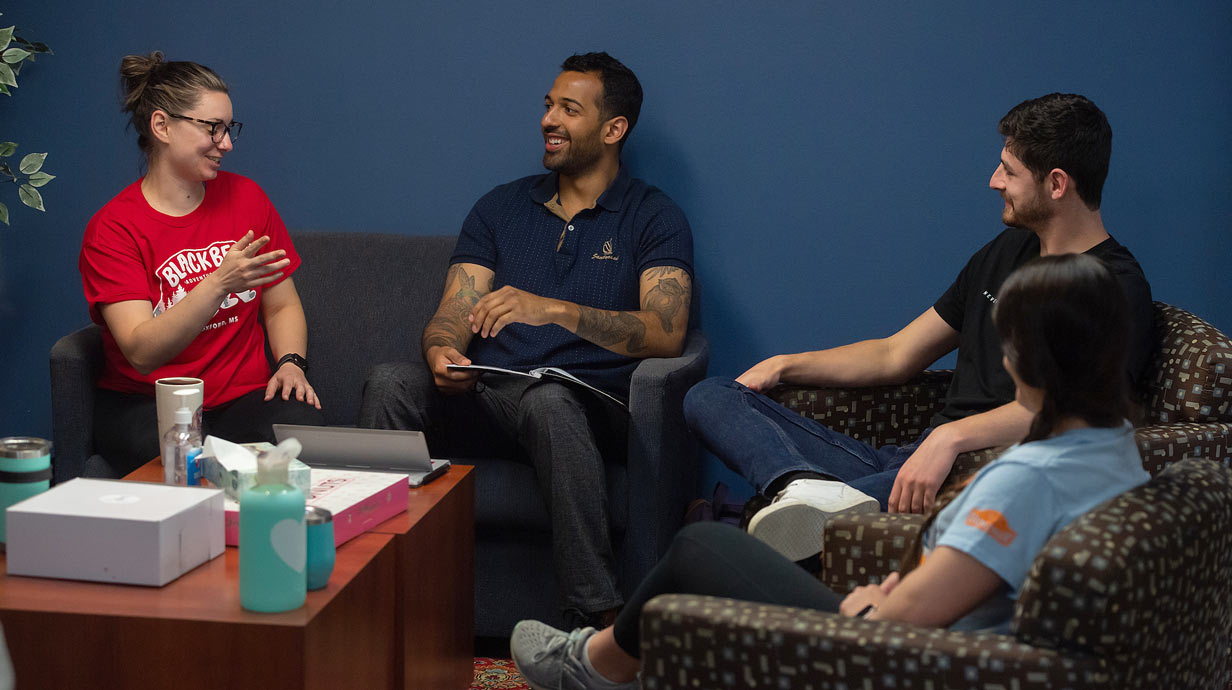Psychology, Ph.D.
Prepare yourself to become a scientific researcher of human behavior or an evidence-based practitioner.

About the Ph.D. in Psychology
The Department of Psychology in the College of Liberal Arts offers the Ph.D. in Psychology, with emphases in Clinical Psychology and Experimental Psychology.
The emphasis in Clinical Psychology is based on the scientist-practitioner model and thus designed to prepare an individual to become a professional psychologist capable of working in clinical and/or research settings.
The emphasis in Experimental Psychology provides rigorous and supportive scientific training that prepares graduates for careers in a broad spectrum of fields such as academic careers in teaching and research or corporate careers in health, behavioral, or social sciences. Experimental psychology students specialize in cognitive psychology, developmental psychology, or social psychology.
On this Page…
Program Information
Degree
Ph.D. in Psychology
Emphases
Clinical Psychology ;
Experimental Psychology
Required Credit Hours
54
Program Type
Doctorate Program
Program Location
School
Ph.D. in Psychology Program Details
Learn about the application process, academic requirements, and the financial support available to you.
The Department of Psychology welcomes student applications.
- Complete the Graduate School’s Online Application.
- Upload Supplemental Application materials for the Department of Psychology to the link provided by the online application.
See guidelines on webpage for Clinical Psychology and on the webpage for Experimental Psychology
The emphasis in clinical psychology includes 15 graduate-level courses, practicum courses, a doctoral dissertation, and yearlong APA-accredited internship. See details on the clinical emphasis webpage.
- Psy 703: Quantitative Methods in Psychology I
- Psy 704: Quantitative Methods in Psychology II
- Psy 709: Advanced Conditioning and Learning
- Psy 710: Cognitive Assessment
- Psy 711: Personality Assessment
- Psy 729: Advanced Psychopathology
- Psy 730: Evidence-based Clinical Interventions
- Psy 731: Theories of Psychotherapy
- Psy 741: Ethics & Prof Standards of Clinical Psychology
- Psy 748: Research Design
- Psy 751: History and Systems of Psychology
- one course in each of the following areas:
- multicultural psychology
- physiological psychology
- developmental psychology
- cognitive psychology
- social cognition
- 2 elective classes
- 1 semester of assessment practicum (Psy 722)
- 2 semesters of clinical practicum (Psy 723, 724, 728)
Students in the Ph.D. in Psychology complete 54 credit hours.
The emphasis in experimental psychology includes 12 graduate-level courses and a doctoral dissertation. Additional minors and/or concentrations in gender studies and applied statistics are also available. See details on the experimental emphasis webpage.
- Psy 703: Quantitative Methods in Psychology I
- Psy 704: Quantitative Methods in Psychology II
- Psy 717: Individual Experimental Research
- Psy 735: Seminar on College Teaching
- Psy 748: Research Design
- Psy 755: Research Colloquium every semester
- four courses from the six core courses of
- Psy 707: Advanced Cognitive Psychology
- Psy 709: Advanced Conditioning and Learning
- Psy 712: Advanced Social Psychology
- Psy 713: Advanced Social Cognition
- Psy 715: Physiological Psychology
- Psy 718: Advanced Developmental Psychology
- Psy 751: History and Systems of Psychology
- two elective courses, excluding Psy 747 (Problems), 697 (Thesis), and 797 (Dissertation)
Historically the Department of Psychology has been able to
- provide a full tuition scholarship,
- subsidized health insurance, and
- monetary stipend each year to every student while enrolled on campus, so long as they are making satisfactory progress and matriculate through the program in a timely manner.
For more information, visit Graduate Programs in the Department of Psychology.
The Graduate School's financial aid webpage lists a variety of funding possibilities.
The Department of Psychology is housed in Peabody Hall, a historic, three-story building in the center of campus. The building includes several classrooms, a computer lab, faculty and graduate student workspace, and research labs.
The Psychological Services Center serves as the training clinic for the clinical psychology graduate program and will be moving into the third floor of the South Oxford Center.
- Contextual influences on psychological outcomes, including how lay-theories influence individual and interpersonal outcomes, cultivating youth environmental leadership and civic engagement, and understanding the mental health effects of disasters.
- Development across the lifespan from understanding social and cognitive development in early childhood, to dissemination of evidence-based services for children and adolescents, to adolescent anxiety disorders and substance use within a family context, to health behaviors and activity engagement in aging.
- Interpersonal influences on well-being including stigma and discrimination, social ostracism, interpersonal relationships, and sexuality.
- Health psychology, including psychological and social factors that contribute to poor health in adults with chronic health conditions.
- Psychopathology including cognitive-behavioral therapies, understanding and treatment of anxiety disorders across the lifespan, dimensional models of personality disorders and antisocial behavior, misophonia, and the role of meaning and purpose in life.
- Self Regulation including choice, self-knowledge, rule governance, behavior acquisition, behavior analysis; facial and verbal expressions of emotion and self-regulation of emotion; impulse control and psychopathology; and the development of executive function.
- Visual perception focused on understanding low-level visual processes.
Department of Psychology
Department Video
Hear firsthand from students, faculty, and staff about the Psychology program.
Next Steps
Explore Affordability
We have a variety of scholarships and financial aid options to help make college more affordable for you and your family.
Apply to the University of Mississippi
Are you ready to take the next step toward building your legacy?
